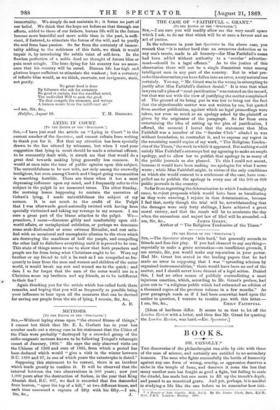THE CASE OF " FAITHFULL v. GRANT."
cm THE EDITOR OF THE " SPECrATOR.1
am sure you will readily allow me the very small space which I ask, to do me that which will be at once a favour and an act of justice.
In the reference in your last Spectator to the above case, you remark that "it is rather hard that an erroneous deduction as to any one's tenets, made in all honesty—for Miss Faithfull's name had been added without authority to a ' secular ' advertise- ment—should be a legal offence." As to the justice of this observation there will not be a single dissentient voice among intelligent men in any part of the country. But in what pre- cedes this observation you have fallen into an error, a very natural one certainly. You say, " Mr. Grant was in the wrong in attempting to justify after Miss Faithfull's distinct denial." It is true that what lawyers call a plea of " semi-justification " was entered on the record, but that was not with the view of justifying the matter complained of. The ground of its being put in was but to bring out the fact that the objectionable matter was not written by me, but quoted from another publication, against which no legal proceedings were taken, nor even so much as an apology asked by the plaintiff or given by the originator of the paragraph. So far from even entertaining the idea of setting up the plea of justification, I offered, the moment I learnt that the statement that Miss Faithfull was a member of the " Secular Club" alluded to was without foundation, to contradict it, and to express my regret in the remaining unsold copies of my work, "The Religious Tenden- cies of the Times," the work in which it appeared. But nothing would satisfy Miss Faithfull's attorneys but my agreeing to make an ample apology, and to allow her to publish that apology in as many of the public journals as she pleased. To this I could not assent, because it would have been making me apologize for what I never wrote ; while Miss Faithfull might, in virtue of the only conditions on which she would consent to a settlement of the case, have com- pelled me to publish the apology in every one of the 500 or 600 public journals in the country.
So far from regretting the determination to which I unhesitatingly came, to reject proposals which would have been as humiliating as they were exacting, I rejoice in that determination, because I feel that, costly though the trial will be, notwithstanding that the damages were only forty shillings, I have achieved a great moral victory, and that the result will be to accelerate the day when the anomalous and unjust law of libel will be amended.—I Author of " The Religious Tendencies of the Times."






























 Previous page
Previous page